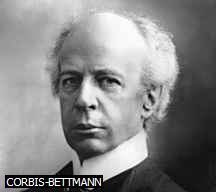.
Based on Merriam-Webster's
Collegiate® Dictionary
Use the BACK button
on your browser to return
laughing stock
an object of jokes or ridicule; a butt
Laurier, Sir Wilfrid.(1841-1919)
7th prime minister of the
Dominion of Canada (1896-1911); attended the 1907 Imperial Conference at
which his
remark shows there was no confederation whatsover in Canada that supposedly
happened in 1867. He also attended the 1911 conference, which also showed
the same.
At the
1907 Imperial Conference, long after a supposed 1867 'confederation', Sir
Wilfred Laurier said."We
are all His Majesty's governments". In 1911
at the Imperial Conference, Laurier pushed his proposal that Canada not
be bound by any British treaty without its (Canada's) consent, because
she.still was
under British control, showing Canada was not a free and independent nation;
there was no confederation. These remarks, made forty years after 1867,
show there was no confederation of Canada in 1867..comprised
with Microsoft® Encarta® Encyclopedia 99. © 1993-1998 Microsoft
Corporation. All rights reserved.
legislate,
legislated,
legislating,
legislates
to create or pass laws
to create or bring about by or as if by legislation
legislation
the act or process of legislating;
lawmaking; a proposed or enacted law or group of laws
legislature
an officially elected or
otherwise selected body of people vested with the rsponsibility and power
to make laws for a political unit, such as a state or nation
legislative
of or relating to the enactment
of laws; resulting from or decided by legislation;
having the power to create laws; intended to legislate;
of or relating to a legislature
legislative
the legislative body of
a government; a legislature
legislatively
legist
a specialist in law
lieutenant governor.(*)
in Canada, appointed by the Governor General to
represent in this case, Britain, regarding the necessity of provincial
legislation having to carry his signature in order to become law; ensuring
no legislation is passed without Britain's oversight
Locarno: The Treaties
of Locarno, a series of seven agreements designed to promote the security
of western Europe at the end of World War I, many of them dealing with
national boundaries, and signed in London, England, on December 1, 1925.
Locarno is a town of southern
Switzerland at the northern end of Lake Maggiore. First mentioned in 749,
it passed to Milan in 1342 and was taken by the Swiss in 1512. The Locarno
Pact between Germany and various European powers was signed here in Locarno
December 1, 1925, in an effort to promote peace and maintain existing territorial
borders. The city is today a popular resort. Population, 14,300.
Switzerland: Switzerland is a republic governed
under a constitution adopted
on May 29, 1874, amended many times since. The Swiss political system is
democratic
and as such holds to the principles of sovereignty
of the people and separation of powers, where all powers not delegated
to the confederation by the Swiss constitution are reserved to the cantons
(small territorial divisions of the country; the states of Switzerland)
Switzerland is a republic governed
under a constitution adopted
on May 29, 1874, amended many times since. The Swiss political system is
democratic
and as such holds to the principles of sovereignty
of the people and separation of powers, where all powers not delegated
to the confederation by the Swiss constitution are reserved to the cantons
(small territorial divisions of the country; the states of Switzerland)
The Swiss.people
control.their
country.and are very strict on what
they allow their government to do. It is so unlike Canada; where the
'non' government controls the people, and basically involves itself
in what it alone determines is best for the rest of the country (and of
late with recent, mostly Liberal administrations, much of it has been self-serving
and corruption based)
In December 1992, Swiss voters
soundly rejected joining the European Economic Area (European Union), a
free trade zone linking many Western European countries.
The Swiss rejected a value
added tax (like Canada's GST) three times.(the
Swiss reject it 3x; Canadians never had an opportunity to vote on that
which was to affect them even one time, and still don't; things in Canada
are just shoved upon the people, whether or not they want it or like it;
such is the parliamentary dictatorship
type of governing Canadians have been
subjected to). The Swiss finally agreed to a tax that had it the
way.the Swiss people.wanted
it in order to have additional and ongoing funding for national projects.
In June 1994 Swiss voters rejected
a referendum that would have authorized
Swiss troops to take part in UN peacekeeping operations.
comprised
with Microsoft® Encarta® Encyclopedia 99. © 1993-1998 Microsoft
Corporation. All rights reserved.
lopsided
heavier, larger, or higher on one side than on
the other; sagging or leaning to one side
lopsidedly, lopsidedness
ludicrous
amusing or laughable through obvious absurdity,
incongruity, exaggeration, or eccentricity; meriting derisive laughter
or scorn as absurdly inept, false, foolish and idiotic; laughable
ludicrousness, ludicrously
lieu
place; stead
in lieu of
in place of; instead of
.
I n d e x o f
s i t e
.
|